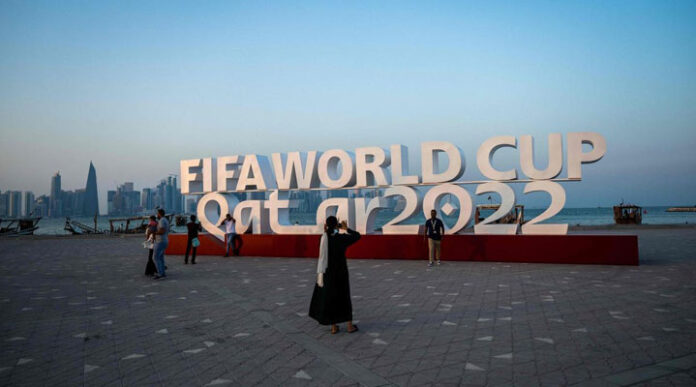Residents of Qatar face the risk of persecution if they stand up for gay rights during the World Cup, Human Rights Watch (HRW) has warned.
Raising the rainbow flag, engaging in chants, or even liking pro-LGBTQ+ content on social media may leave a trail of evidence that could be used to persecute individuals once the World Cup has ended, according to Rasha Younes of HRW’s LGBT Rights Program.
“As Qatar advances its surveillance capabilities including inside football stadiums, the possibility of LGBT Qataris being persecuted for publicly supporting LGBT rights will remain long after the fans have gone,” Younes said.
“If an individual were even to retweet a post about affirmative LGBT rights this individual could be targeted long after the World Cup is over and in ways that we may not have access to.”
Concerns have long been raised over the safety of LGBTQ+ visitors to Qatar during the World Cup. This week the campaigner Peter Tatchell claimed he had been arrested in the country for protesting for LGBTQ+ freedoms. There have also been mixed messages from the UK government over how fans should approach any visit to the country for the tournament, with the foreign secretary, James Cleverly, suggesting on Wednesday that they should modify their behavior, with “a little bit of flex and compromise”. On Thursday, the Conservative party chair, Nadim Zahawi, appeared to contradict Cleverly, saying: “The policies of the government of Qatar are not our policies, nor would we condone them.”
Residents have long faced discrimination from the state. Homosexuality is illegal in Qatar, with punishments of up to seven years in jail possible. This week HRW published a report which documented what it claimed was “arbitrary” police action against LGBTQ+ residents, including six cases of severe and repeated beatings and five cases of sexual harassment in police custody between 2019 and 2022.
A Qatari official said HRW’s allegations “contain information that is categorically and unequivocally false”, without specifying.
Younes said that those within football should listen to concerns from LGBTQ+ supporter groups but that the risk faced by locals was greater. “LGBT residents of Qatar are the people we are most concerned about,” she said. “There needs to be an honoring of expression during the World Cup. But we also know that in any potential crackdown against individuals beyond the World Cup the people who are the most affected are going to be the LGBT residents of Qatar.
“This needs to be factored into any policies, any concrete interventions that Fifa undertakes, or the Supreme Committee [the body in charge of organizing the World Cup] or any coalitions, in terms of affording protections for the LGBT residents of Qatar who may face any grievances.”
The Supreme Committee said: “The Fifa World Cup will be a tournament for everyone – much like previous editions of the tournament.
“Everyone will be welcome to Qatar in 2022, regardless of their race, background, religion, gender, sexual orientation, or nationality.
“We are a relatively conservative society – for example, public displays of affection are not a part of our culture. We believe in mutual respect and so whilst everyone is welcome, what we expect in return is for everyone to respect our culture and traditions.”





